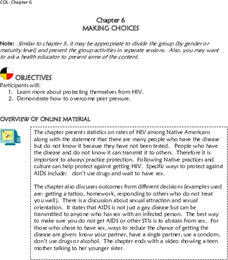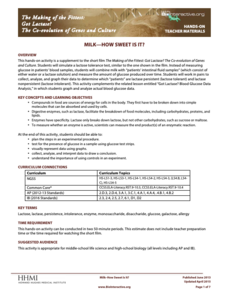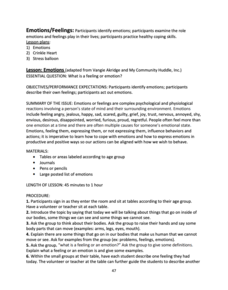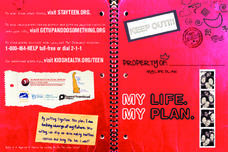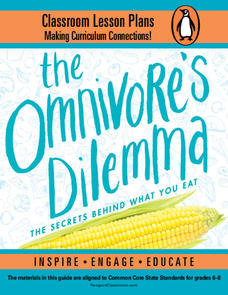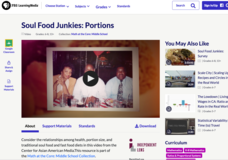Healthy Native Youth
Chapter 4: Learning About Disease
Communicable diseases are the focus of a lesson that primarily uses discussion, a hands-on activity, and a worksheet to drive their point home. Lotion and glitter create a strong visual for communicable diseases. A practice page provides...
Healthy Native Youth
Chapter 5: Learning About HIV/AIDS/STI's and Hepatitis Transmission
Middle schoolers delve deep into facts about HIV, AIDS, Hepatitis, and other STI's by way of discussion and a hands-on activity. Scholars ask and discuss questions anonymously using a Question Box. Two experiments showcase the...
Healthy Native Youth
Chapter 6: Making Choices
A lesson looks closely at risky behavior such as teen pregnancy and sexually transmitted diseases. Middle schoolers use a question box to ask questions anonymously. They role-play what life would be like if they became pregnant then...
Healthy Native Youth
Chapter 7: Revisiting the Circle of Life
Scholars revisit the Circle of Life to examine positive character traits—mental, physical, spiritual, and emotional. Pupils discuss how those character traits could help them make responsible decisions and not contract HIV/AIDS. Learners...
Nemours KidsHealth
Puberty: Grades 6-8
Going through puberty isn't easy, or for the faint of heart. Prepare middle schoolers for the challenges of the changes with activities that ask them to assume the role of a reporter for the Human Body Olympics. Writers craft a news...
Nemours KidsHealth
Puberty: Grades 3-5
With puberty comes lots of changes to one's body. Scholars explore those changes with two lessons that examine the role of the pituitary gland and hormones. In the first lesson, pupils take on the role of the pituitary gland, write a...
Nemours KidsHealth
Self-Esteem: Grades 6-8
It would be lovely if we all had mirrors that told us were were fabulous. Alas, such devices designed to boost self-esteem have yet to be invented. However, there are activities that can prove effective. Two activities in a four-page...
Thoughtful Learning
Calming Down with Deep Pressure
Stressed out and tensed up! When stressed our bodies tense and our muscles clench. Teach youngsters how to calm down with simple deep pressure exercises. Press and release!
Acoustical Society of America
How Loud Is Too Loud?
How loud was that? Individuals build wheels displaying different sounds. Then, learners use the wheels to find the number of decibels the sound creates and how long they could withstand the sound before potential hearing damage.
Purdue University
Benefits of Connecting with Nature
Feel the healing effects of nature. Individuals learn about the benefits of nature using imagery. They begin by defining words to express how they feel emotionally and then practice using those words with hands-on activities. Once they...
SOCIAL & EMOTIONAL LEARNING TOOLKIT
This SEL Toolkit that can be added to any lesson to help guide social emotional aspects for any subject area.
A Mighty Girl
Tu Youyou
Meet Tu Youyou, the first woman from China to win a Nobel Prize. Display a poster of Youyou in your classroom to inspire young scientists to persevere where others have failed. Her discovery of artemisinin to cure malaria has saved...
Radford University
Corn and Popcorn
Have a popping good time. Using probability and statistics skills, learners determine which type of popcorn to buy based on the percentage of kernels popped. After analyzing corn and popcorn sales to make a prediction of future sales,...
Ashoka
A Toolkit for Promoting Empathy in Schools
Instill kindness with a unit all about empathy. Lessons and activities follow a prepare, engage, reflect, and action sequence. Learning experiences include making the classroom a safe environment, peer-invented handshakes, discussions...
Achieve
Medication Dosage
Here's the cure to boredom. Given a patient file, including medication dosage information, scholars determine the amount of medication left in the patient's bloodstream over time. They analyze the sequence of numbers and determine a...
Southwest Educational Development Laboratory
The Human Body
Nothing is more relevant than the study of the human body. A series of 10 human body lessons begins with growth, ends with reproduction, and hits all the major systems in between. Each lesson provides opening and closing activities as...
Howard Hughes Medical Institute
Pedigrees and the Inheritance of Lactose Intolerance
What, exactly, causes lactose intolerance? Scholars view a video describing a Finnish study that determined why some people are tolerant while others are intolerant. They then use the data from the study to reenact the experiment and...
Howard Hughes Medical Institute
Milk—How Sweet Is It?
Have you ever wondered why some people are lactose intolerant? Participants test simulated patients in a hands-on lab activity to find out! They learn about lactose intolerance by performing an experiment, analyzing data, and drawing...
San Diego County District Attorney
Emotions/Feelings
Three lessons delve deep into the topic of feelings and the importance of expressing one's emotions. Through grand conversation, hands-on learning experiences, and reflective writing, scholars interpret the ups and downs of everyday...
Northern Ireland Curriculum
Dealing with Feelings
Five activities encourage scholars to look inside, get in touch with their emotions, and express their feelings appropriately. Stories set the stage for feeling identification and in-depth discussions. Role play and the act of miming...
Delaware Health and Social Services
My Life. My Plan.
A colorful packet gets teens thinking about their life plan. Do they want to go to college? Do they want to be in a relationship? Do they want to be sexually active? The packet provides tips on how to develop healthy relationships, make...
Penguin Books
The Omnivore’s Dilemma, Young Readers Edition
As the saying goes, you are what you eat. A useful set of lesson plans encourage young readers to take a second look at their eating habits. Pre- and post-reading questions bring in reflective writing and discussion while extension...
PBS
Soul Food Junkies: Portions
Serve up a rate of percents. The Math at the Core resource investigates the percent of daily value of sodium and saturated fats in different foods. Pupils determine the number of serving sizes they eat of popular snack foods and...
Howard Hughes Medical Institute
Lactose Intolerance: Fact or Fiction
Around the world, about 2/3 of adult humans are lactose intolerant. Scholars work in small groups to discuss a few statements about lactose intolerance. Then, they watch a video on the topic and readdress each statement. Whole-class...




